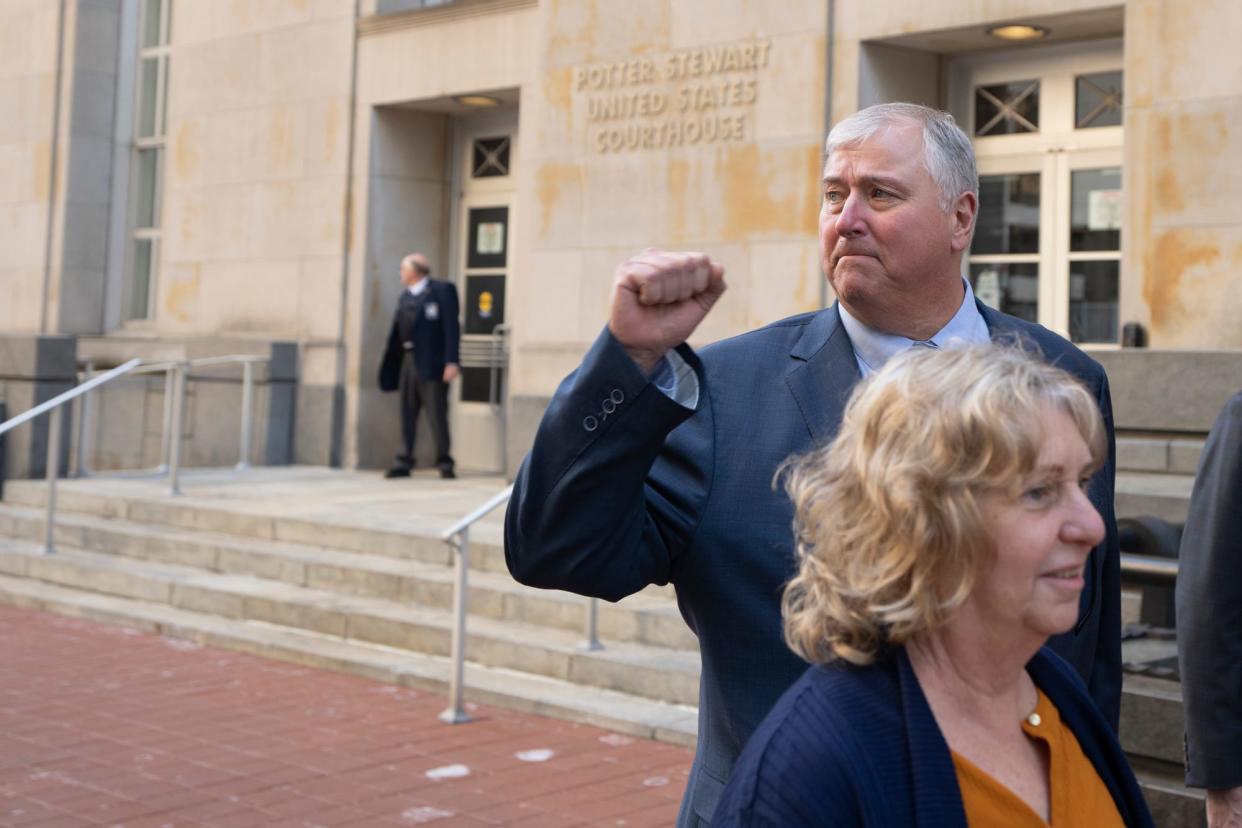Ohio Politics Explained: Do Ohioans deserve income tax refunds for 2020?

Former Ohio House Speaker Larry Householder told jurors the prosecution in his public corruption trial had it all wrong. The governor visited East Palestine as we approach one month since the train derailment, and Ohio's Supreme Court heard a case challenging the 2020 commuter tax.
We break down what it all means In this week's episode of Ohio Politics Explained. A podcast created by the USA TODAY Network Ohio Bureau to catch you up on the state's political news in 15 minutes or less.
This week, host Anna Staver was joined by Ohio Democratic Party Chair Liz Walters. She will be joined in a few weeks by Ohio Republican Party Chair Alex Triantafilou.
1) Householder takes the stand
Ohio's former House Speaker took the stand this week and used his folksy, Appalachian farmer charm to try and convince a jury that he's not guilty of taking a bribe to pass a law bailing out two nuclear power plants.
For example, Householder disputed the prosecution's claim that a $400,000 was slid across a conference table to him by a lobbyist for those power plants.
"There wasn’t even a table to slide it across," Householder said.
And while he did hitch a ride on First Energy's private jet to the inauguration of former President Donald Trump, he didn't spend several days being wined and dined by the company's executives, he said.
Things got testy, though, when federal prosecutors cross-examined the former speaker.
Householder said he didn't know First Energy paid for his hotel room in Washington, D.C. He thought the Ohio Republican Party arranged the room.
“You weren’t aware of who was paying for your hotel room?”Assistant U.S. Attorney Emily Glatfelter asked.
2) One month after the derailment in East Palestine
Gov. Mike DeWine returned to East Palestine this week. The Ohio Senate held its first hearing on the Feb. 3 train derailment. And residents continued to worry about the long-term health effects from the chemicals that spilled into their water, soil and air.
“This is not an easy fix, and Americans love easy fixes," state Sen. Michael Rulli, R-Salem, said. "That is not going to happen here. We need years of monitoring the soil and testing. We need to build a foundation for the beautiful city of East Palestine, and we need to make ourselves whole again."
3) Commuter tax lawsuit reaches Supreme Court
A case asserting that millions of Ohioans are entitled to income tax refunds from the 2020 shutdowns went before the state Supreme Court this week.
It's called Schaad v Alder, and it says that an emergency law passed by state lawmakers was unconstitutional. The law let cities collect commuter taxes from people who worked from home during the shutdowns. Basically, they were taxed where their office building was, not where they actually were.
Josh Schaad, from a suburb of Cincinnati, sued the city after it refused to give him a refund, saying what it was doing amounted to taxation without representation.
Cincinnati, and both lower courts, said it was legal because Schaad is an Ohio resident and state lawmakers can change the tax laws for its residents.
4) Putting the governor in charge of education
A plan to move control over Ohio's Department of Education to the governor's office took another step this week.
The Ohio Senate voted 26-7 to pass a bill that would take control over curricula from the partially elected state board of education and give it to a new cabinet position in DeWine's office.
Republicans said the change would make the department more nimble and better prepare Ohio children for their future careers. But Democrats said the move would make education policy even more political and potentially cut parents out of the process.
"I’m disappointed. I'm not surprised," Sen. Catherine Ingram, D-Cincinnati, said. "Unfortunately, this bill will not do what is intended, and hopefully, when it does get to the House, additional amendments will be made."
Listen to "Ohio Politics Explained" on Spotify, Apple, Google Podcasts and TuneIn Radio. The episode is also available by clicking the link in this article.
The USA TODAY Network Ohio Bureau serves The Columbus Dispatch, Cincinnati Enquirer, Akron Beacon Journal and 18 other affiliated news organizations across Ohio.
This article originally appeared on The Columbus Dispatch: Ohio politics podcast: Supreme court hears commuter tax case

